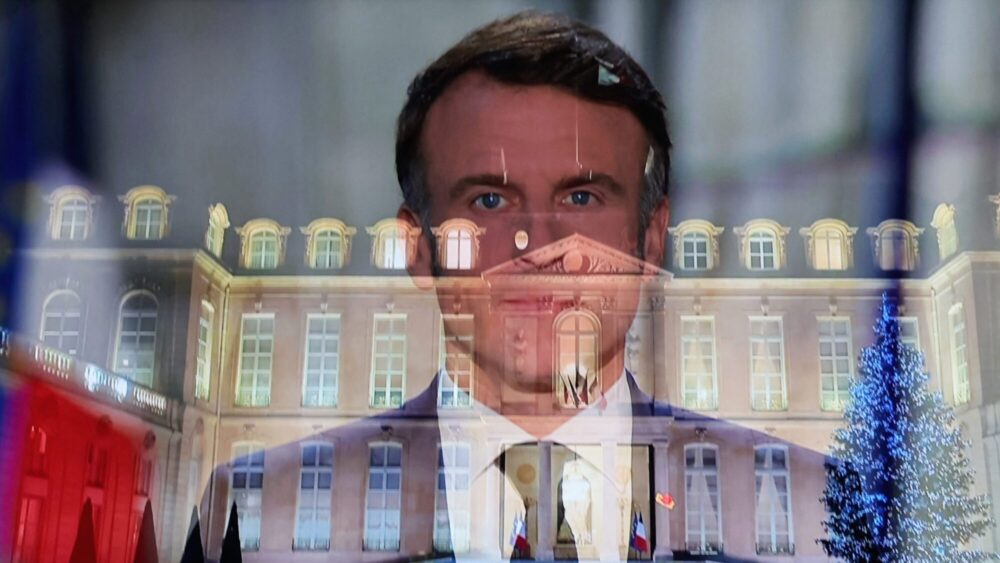
French President Emmanuel Macron is seen on a screen as he delivers his televised New Year’s address to the nation from the Elysee Palace, in Paris on December 31, 2024.
Kiran RIDLEY / AFP
In his televised address on December 31st, traditionally devoted to greeting the New Year, President Emmanuel Macron took stock of the year of terrible political anarchy that France experienced in 2024. Paying lip service to his responsibility, he promised to consult the French people more and “directly,” but his exact plans remain obscure, giving rise to discontent and annoyance.
The audience figures were not in Emmanuel Macron’s favour, with only 9.7 million French people watching his live televised address—half a million fewer than last year. Usually, the president’s New Year’s address is more general and apolitical. This time, however, Macron could not avoid making a political assessment, given the widespread discontent since the surprise dissolution of the National Assembly in June 2024 plunged the country into chaos. He acknowledged that “the dissolution has, for the moment, brought more divisions to the Assembly than solutions for the French people.”
In a clumsy attempt to justify himself, Macron claimed he had wanted to ‘give the floor back’ to the electorate, but was forced to, at last, openly admit that he had failed: “lucidity and humility require us to recognise that, at this time, this decision has produced more instability than serenity, and I take full responsibility for that,” he explained, without elaborating on his personal responsibility, which is nonetheless overwhelming.
The French president’s furtive and discreet mea culpa was short-lived. The rest of his speech was characterised by his desire to show that he was still the master of the game and that, despite appearances, still had full control of the levers of power. In a voluntarist impulse, using a majestic ‘we’ that sounded a little false coming from a man without a majority and whose party has been in the minority in the government in place since December, he declared that he intended to “continue to decide.” He then used an enigmatic phrase addressed directly to the French people, which has since been extensively dissected by political commentators: “I will also ask you to decide on some of these decisive issues. For each of you will have a role to play.”
Will the president resort to a referendum in 2025? The word was not uttered. The referendum mechanism was designed by General de Gaulle, founder of the 1958 Constitution, to be the preferred political tool for maintaining the unique relationship between the people and the president. But so far, since Macron came to power in 2017, he has not used it once. In fact, there hasn’t been a referendum in France since 2005, when the French—massively—rejected the draft European constitutional treaty.
Macron is accustomed to making grand announcements of this kind that are never followed up. This is not the first time he has pretended to want to propose referendum topics to the French, but he has never actually acted on them.
In 2017, shortly after his election, he explained that he wanted to reform government institutions using the referendum route. Nothing came of it. At the time of the Yellow Vests crisis—a series of protests against the disproportionate tax burden on ordinary French people, especially the high fuel taxes—with protesters campaigning for the introduction of a citizen-initiated referendum, the subject was once again mentioned. Nothing came of it. In December 2020, a few months after the COVID crisis, he toyed with the idea of a referendum on environmental issues. Again, nothing came of it. Pension reform, riots in New Caledonia—each of the major crises of Macron’s presidency has been an opportunity to dangle the lure of a referendum to appease public opinion. But the only popular ‘consultations’ to which the President has been willing to give in have been those of the ‘citizens conventions’—small assemblies made up of members appointed through opaque procedures, leading to truncated debates on sensitive subjects, and consistently producing conclusions in line with the president’s wishes—a quasi-Soviet operation denounced by the political opposition.
The Left harshly criticised the president’s speech as “out of touch,” “authoritarian” and “arrogant.” Members of the far-left La France Insoumise party renewed their calls for Macron to resign. On the Right, Rassemblement National (RN) blasted a self-centred and solitary head of state, bathed in an end-of-reign atmosphere. RN leader Marine Le Pen expressed her scepticism about the potential use of a referendum in 2025.
And yet, there is no shortage of hot topics for referendums that the majority of French people want, from migration policy to reforming the electoral system to establishing a form of proportional representation. There is little reason to believe that Macron will embrace the referendum, a tool designed by General de Gaulle to test presidential legitimacy and gauge popular support. After all, de Gaulle himself lost a referendum in 1969 and resigned right in the aftermath. We can reasonably trust Emmanuel Macron not to follow in his footsteps.
